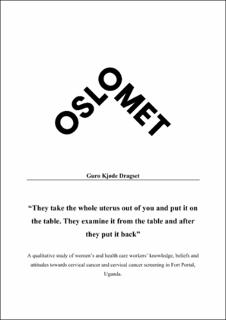“They take the whole uterus out of you and put it on the table. They examine it from the table and after they put it back” A qualitative study of women’s and health care workers’ knowledge, beliefs and attitudes towards cervical cancer and cervical cancer screening in Fort Portal, Uganda.
| dc.contributor.advisor | Lindskog, Benedikte Victoria | |
| dc.contributor.author | Dragset, Guro Kjøde | |
| dc.date.accessioned | 2021-05-10T08:42:20Z | |
| dc.date.available | 2021-05-10T08:42:20Z | |
| dc.date.issued | 2020 | |
| dc.identifier.uri | https://hdl.handle.net/11250/2754540 | |
| dc.description.abstract | Cervical cancer is a disease that is emphasised as one of the gravest threats to women’s life. In low and middle-income countries, it is the cancer type that kills most women and girls. The World Health Organisation situates cervical cancer as a public health problem and highlights that countries need to put focus on strategies towards eliminating cervical cancer as a global burden of disease. In alignment with this, the Ugandan MoH emphasise comprehensive screening services to control and prevent the disease throughout the country. However, a report shows that 80 % of women in Uganda only seek professional help when cervical cancer is in an advanced stage. This qualitative study is an exploration of women’s and health workers’ knowledge, attitudes and beliefs towards cervical cancer and screening in Fort Portal, Uganda. Through in-depth interviews and observations this study explores if these factors influence choices and motivations to present for cervical cancer screening. It suggests that health behaviours cannot be separated from national and global policies; hence this study facilitates a holistic perspective. Based on findings this study reveals that local understandings, beliefs and attitudes as well as societal, historical, economic and political dynamics are critical factors in order to succeed when implementing health services. By providing insights into women’s and health workers’ knowledge, beliefs and attitudes towards cervical cancer screening, and shedding light on access- and awareness in Uganda generally and Fort Portal particularly, this study can contribute to more knowledge on how to implement cervical cancer services that are sensitive to local needs and hence may encourage more women to come forward for screening. | en_US |
| dc.publisher | OsloMet-Storbyuniversitetet | en_US |
| dc.subject | Global health | en_US |
| dc.subject | women's health | en_US |
| dc.subject | Health policy | en_US |
| dc.subject | Health interventions | en_US |
| dc.title | “They take the whole uterus out of you and put it on the table. They examine it from the table and after they put it back” A qualitative study of women’s and health care workers’ knowledge, beliefs and attitudes towards cervical cancer and cervical cancer screening in Fort Portal, Uganda. | en_US |
| dc.type | Master thesis | en_US |
| dc.description.version | publishedVersion | en_US |
